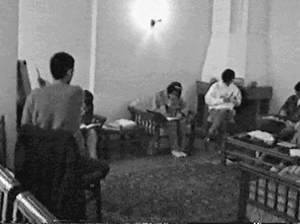The recent attack on The Baha’i Institute for Higher Education (BIHE) in Iran and the arrest of its faculty members has caused a great reaction in many corners. The Government of Iran has spread false accusations and mis information about BHIE. The following is some extracts to explain the true nature of BHIE.
“Regard man as a mine rich in gems of inestimable values” declares the Baha’i Writings, “Education, can, alone, cause it to reveal its treasures, and enable mankind to benefit therefrom.”
See BHIE’s official website for programmes, faculty and admission:
“The Bahá’í Institute for Higher Education (BIHE) was founded in 1987 in response to the Iranian government’s continuing campaign to deny Iranian Bahá’ís access to higher education. As its graduates excel in post graduate studies internationally, the BIHE’s commitment to high academic standards, international collaboration, and an innovative teaching-learning environment is increasingly recognized. The BIHE offers 17 university-level programs across 3 faculties and continues to develop and deliver academic programs in sciences, social sciences, and the arts.” (BHIE website)
Extract from Baha’i International Community’s document on “The Baha’i Question: Cultural Cleansing in Iran“
see: http://question.bahai.org/003_2.php
The Bahá’í Institute for Higher Education
N WHAT THE New York Times called “an elaborate act of communal self-preservation,” the Bahá’í community in 1987 established its own higher education program to meet the educational needs of as many of its young people as resources would allow. That program evolved over the years into a full-fledged university, known as the Bahá’í Institute for Higher Education (BIHE), which, until mid-1998, had an enrollment of some 900 students, a faculty of more than 150 first-rate academics and instructors, and complete course offerings in ten subject areas.
Because of the continual threat of persecution, the BIHE was forced to operate in a highly circumspect and decentralized manner. Most of its classes were held in private homes throughout Iran and what little permanent infrastructure it had was composed of a handful of rented classrooms and laboratories scattered throughout the capital.
 Then, in an act that speaks volumes about the government’s real attitude towards Bahá’ís, hundreds of government agents fanned out across the country in September 1998, arresting some 36 BIHE faculty and staff, raiding some 500 homes, and confiscating hundreds of thousands of dollars worth of books, equipment and records in a blatant effort to shut the university down.
Then, in an act that speaks volumes about the government’s real attitude towards Bahá’ís, hundreds of government agents fanned out across the country in September 1998, arresting some 36 BIHE faculty and staff, raiding some 500 homes, and confiscating hundreds of thousands of dollars worth of books, equipment and records in a blatant effort to shut the university down.
“The materials confiscated were neither political nor religious, and the people arrested were not fighters or organizers,” said the New York Times, in a 29 October 1998 article about the raids. “They were lecturers in subjects like accounting and dentistry; the materials seized were textbooks and laboratory equipment.”
Teaching was done principally via correspondence, or, for specialized scientific and technical courses and in other special cases, in small-group classes that were usually held in private homes.
“At the beginning, the students did not even know the names of their professors,” said one BIHE professor, who, like most others quoted in this article, wanted to remain anonymous out of fear for his safety and that of his relatives in Iran. “Even after three or four years, the students did not know the names of their professors. They had never seen them. Because it was very dangerous. If somebody knows the name of them, maybe they would tell their friends. So it was all correspondence at the beginning of this plan.”
Over time, however, the Institute was able to establish a few laboratories, operated in privately owned commercial buildings in and around Tehran, for computer science, physics, dental science, pharmacology, applied chemistry and language study. The operations of these laboratories were kept prudently quiet, with students cautioned not to come and go in large groups that might give the authorities a reason to object.
Among its faculty were approximately 25 or 30 professors who had been fired from government-run universities after the 1979 Islamic Revolution. Other faculty members included doctors, dentists, lawyers and engineers. The majority were educated in Iran, but a good number have degrees from universities in the West, including the Massachusetts Institute of Technology, Columbia University, the University of California at Berkeley and the Sorbonne. None of the Bahá’í faculty members were paid for their time; all worked as volunteers.
“These youth are very precious people,” said a faculty member, explaining why they were willing to take such risks, without monetary remuneration, to establish the Institute. “We all care about them. They have been through tests and trials and they had no hope. They have been deprived of many things so if there was any chance for us to get something better for them, we did it.”
While most of those arrested were ultimately released, and the holding of classes in private homes has resumed on a small scale, the effort by the government to shut down the BIHE clearly demonstrates the degree of hatred and prejudice against the Bahá’ís that remains in certain circles of the government — and shows unambiguously why the Bahá’í community will not be safe until legal protections are firmly institutionalized, regardless of talk of reform.
_____
Source: http://question.bahai.org/003_2.php
May 24, 2011 5:33 pm
Just a note to revise the quotation from Baha’u’llah, which has some errors in spelling: “Regard man as a mine rich in gems of inestimable value” declares the Baha’i Writings, “Education, can, alone, cause it to reveal its treasures, and enable mankind to benefit therefrom.”
May 24, 2011 7:42 pm
Thanks Bill. Corrected.